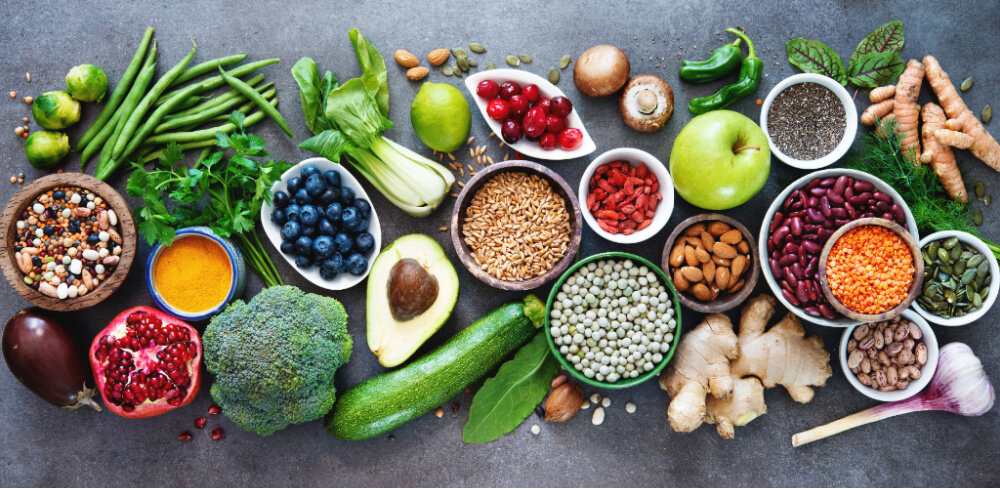In my practice as a Holistic Nutritionist, here’s what I see time and time again with regards to reduced symptoms, improved health, vitality & energy, clearer focus & awareness, and a reduction in anxiety & depression: PLANT BASED FOOD!
In the field of Holistic Health, what we continue to see in our research, time and time again, with regards to treating disease and even REVERSING it: PLANT BASED FOOD!
And so, I believe that it’s high time we begin to educade & work hard towards helping to prevent the onset of more disease and who better to start with than our teens? The teenage years are intense times, there is much to manage on a psychological & social level, but equally as much on a physiological level as well. If you have a teen at home, or have one in your life, you are well familiarized with the hormonal injections & fluctuations, the evolving & roller coaster ride of social dynamics, the rising rates of anxiety & depression in this age group, and the pressures of school & society to succeed, to be awesome, to work hard, and develop a solid plan for the future.
It’s a lot.
As parents & educators, adult role models & mentors, it is our job to be there for them in every way that we can; to support them through the toughest times, to give them independance & guidance continuously, and to be their outlet for security & inspiration, even when they are acting like hormonal jerks 😉
Good food is one of the BEST ways to support them in all that they are dealing with and in setting them up for a better life moving forward and into a future of growing responsibility & autonomy.
Why Plant Based?
The nutrient quantity in plant based food surpasses that of processed and animal foods by an absolute landslide. Part of the issues we are dealing with in regards to continued rising rates in disease in North America is toxicity. Due to a shocking increase in the amount of chemical additives in our food, synthetic hormones, pesticides, herbicides, msg and chemical preservations, as well as a continued decrease in nutrition, and thus, an increase in nutrient deficiencies, the food industry continues to support the onset of all disease. The tantalizing convenience of non-food options that come off of grocery store shelves, sets our teens up for over-consumption of nutrient-void, disease promoting food.
A plant based approach naturally discourages reliance on processed foods. More plant intake encourages more nutrients to feed & fuel the cells, creating less needs & desires for processed junk & refined sugars. For teens, increasing their plant intake can support them in ALL THE AREAS that they may struggle, including reduced use of medications or negative coping strategies.
Ways Plant Based Food Can Benefit Teens:
✔️ Helps to stabilize fluctuating hormones, encourages proper elimination of hormone related toxins, and supports a more stable mood & energy level
✔️ Prevents anxiety, depression, and sleep issues, by promoting stable blood sugars, microbiome balance, and decreased chemical intake
✔️ Decreases levels of toxicity exposure and prevents excess free radical formation
✔️ Nutrient density supports better brain development, ability to focus, mental clarity, and adaptability
✔️ Aids with stress reduction, adaptability, and management, through increased nutrient levels and decreased chemicals
✔️ Promotes a better relationship with food, the earth, and the environment
✔️ Is supportive of a future with reduced toxicity & reduced emissions due to industrialized food & farming practices
✔️ Reduces inflammation in the body, which is a key player in all disease formation and a multitude of symptoms
✔️ Increased plant consumption naturally increases fiber intakes which support better digestion & elimination, which support all other bodily processes
✔️ Supports a deeper connection with food & the earth that encourages better spiritual growth & understanding
✔️ Encourages positive body image through this deeper connection with food, the earth, the environment, & the universe; it helps them find purpose within the connection between food and body in a positive way
The arguments for Plant Based benefits are just beginning to become more well understood and scientifically supported. We are truly at the beginning of a revolution with the food industry and all that we have been taught by them over the last few centuries. Educating our teens: the ones most motivated by ideas and change and cultivating new practices, just makes absolute sense.
Teaching Youth About Plant Based Options
WATCH DOCUMENTARIES: Teens love to glue themselves to screens anyhow, so introduce them to a few Food Industry documentaries. Watch them together, use critical thinking to brainstorm ideas about a future that is different than what it looks like now. Allow them the opportunity to find more education through the inspirational projects of those in the film industry! Some of my favourites: Hungry for Change, Fat, Sick, & Nearly Dead, Food Inc., Food Fight, The Magic Pill, Forks Over Knives. There are just so many! And many are available through Netflix or Youtube.
MAKE MEATLESS MEALS AT HOME: The biggest influence you have as a parent is to model. If you incorporate more meatless meals at home, your teens will naturally begin to develop & expand their palate and become increasingly accustomed to meals that are meat-free and/or plant focused. If you feel this will be a challenge, then start small and go for just 1 meatless meal per week and expand from there. Remember that you can always ADD IN vegetables in volume & variety without changing too much else in the beginning. Need inspiration? Check out my recipe section!
GET THEM IN THE KITCHEN (and the garden): I can’t say this enough! Get those teens in your kitchen as often as possible! Show them how to shop, how to use a knife properly, teach different preparation methods, and give options for different meals & snacks. If you have a garden, enlist their help. Start early and continue as long as they are in your home. The better equipped they are for their future as an eater and a meal creator, the healthier they will be in all areas of life. Looking for outside influence? Watch for my kids/teen classes!
TRY A MONTH LONG EXPERIMENT: Especially if your teen has a health complaint (acne, indigestion, anxiety, sleep issues, body odour, etc.), offer to support them in a gentle dietary challenge. Can they give up processed food for a few weeks, or remove energy drinks/caffeine? Could they try a gentle cleanse or a guided detox? If you try this approach, do the challenge with them, and ideally, enlist the help of a professional - this will encourage better success, more education, and more long-term results.
EXPOSE THEM TO POSITIVE ONLINE INFLUENCERS: Teens love the online world, it feels like an extension of themselves in many ways, and, as long as the influencers are positive and supportive, it can work to their advantage. Find some influencers out there that appeal to your teen (where they are at developmentally and who they are personality-wise) and encourage them to follow that person. The internet can be a powerful influencer, use it to your advantage wherever possible. Check this Foodie Teen’s blog out!
There is no wrong or right way to raise teenagers. As every parent knows, it’s all one big experiment. As long as we continue to learn, to grow together with our kids, and to be open to adapting & evolving as we go, our kids are going to be ok. Feeding them well is just one thing that’s relatively easy to do and will affect them forever. I’m here to help you as much as I can!
As my own son enters the teenage realm, I will continue to educate myself on raising a grounded & healthy teenager.
I aim to share all that I learn along this journey.
Want to read more?
I recently wrote a blog on Feeding the Ravenous Teenager, check it out!





